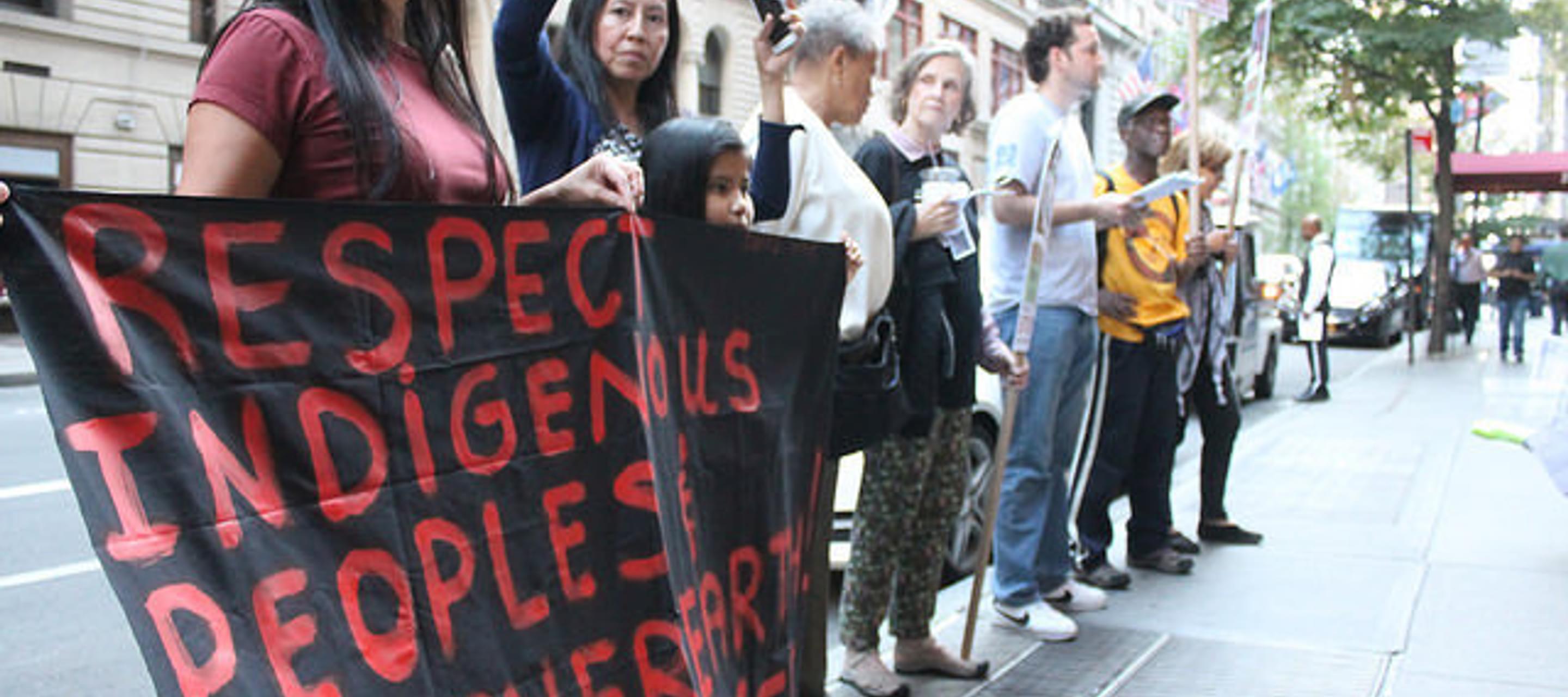Dakota Access Pipeline and the High Cost of Violating Indigenous Rights
26 September 2016

Growing concern in the United States over the proposed Dakota Access Pipeline (DAPL) – a 1,172-mile, 30-inch diameter pipeline that will connect the Bakken and Three Forks production areas in North Dakota to Patoka, Illinois – has resulted in a decision by the US government to pause implementation and launch a review of such projects.
About the DAPL
This move by the Obama administration follows peaceful protests that began in August involving hundreds of people, most from the Standing Rock Sioux Tribe (SRST) in the state of North Dakota. Since then at least sixty people have been arrested. Support for the blockade is growing and the company has stopped construction.
DAPL is majority owned by Energy Transfer Partners (ETP), with minority shares held by Enbridge and Marathon. While, the pipeline does not directly overlap with the SRST reservation, those involved have ignored standards of meaningful consultation required under US law. The pipeline runs within a half-mile of the SRST border. It impacts burial grounds and sacred sites, overlaps with the treaty territory of SRST and other tribes and crosses Lake Missouri, the tribe’s main source of drinking and irrigation water.
A second protest emerged early this month in Iowa, where farmers are also fighting the pipeline's construction, which would take their land based on eminent domain claims. A US District Court in Washington, DC ordered a temporary halt to pipeline construction for 20 miles on each side of the Missouri River on Lake Oahe in North Dakota while pending legal cases are resolved.
Risks to the business
The financial risks for companies operating without a social license are especially significant for pipelines, as evidenced by delays or cancellations afflicting the Keystone XL Pipeline, Northern Gateway Pipeline, the Trans Mountain Pipeline, and others.
A review of the Energy Transfer Partners’ website reveals an absence of policies or information on:
- CSR, community engagement, human rights, or Indigenous rights
- social investment
- sustainability reporting
- senior management expertise on social performance
- board oversight of social performance
Evading responsibility
The Standing Rock Sioux Tribe has repeatedly stated its opposition to the pipeline, so ETP’s push to complete the project conflicts with the international standard of Free, Prior, and Informed Consent. According to Indian Country Today:
Since [SRST] first heard of the proposed project in 2014, SRST leaders have voiced strong opposition to company, state and federal officials, and to Congress. They met with the US Environmental Protection Agency, US Department of the Interior, and the Advisory Council on Historic Preservation to discuss the harm imposed by the pipeline. All three agencies subsequently wrote letters to the Army Corps of Engineers (USACE) expressing environmental and cultural resource concerns related to the pipeline area where pipes and other equipment will be stored for construction.
However, ETP relied exclusively on the US Army Corps of Engineers to engage the tribe, and still defers to the USACE when asked about the protest. The USACE, in turn, ignored the tribe’s concerns, creating an accountability loophole through which both the company and the government evaded responsibility for community engagement.
Risks to all those potentially affected, not just some
Two possible routes were considered for the pipeline: a northern route that passed near Bismarck, and a southern route that passed near the SRST reservation. The company selected the southern route because the northern route “would be near and could jeopardise the drinking water of the residents in the city of Bismarck.” However, nothing has been done to address impacts on the tribe’s drinking water caused by the southern route. In fact, as one account has noted:
Tribal leaders and environmental activists say the company’s draft environmental assessment of December 9, 2015 did not mention that the route they chose brings the pipeline near the drinking water of tribal citizens. In fact, it omitted the existence of the tribe on all maps and analysis, in violation of environmental justice policies
The tribe has real concerns about the pipeline’s environmental impacts, given the lack of responsible engagement by ETP and its past track record. The pipeline’s website contains commitments to safety and an “in the community” page where the company promises to use local labor and minimise disruptions on the land. These commitments fall below industry standards for community engagement and are further weakened by the absence of sustainability reporting that provides evidence of implementation.
Things could have been different
ETP could have carried out environmental and human rights impact assessments and identified the presence of the tribes in the project area, and the presence of the source of the tribe’s drinking water.
It could have chosen to engage with the tribe prior to its construction activities to seek their consent based on accurate project information.
It also could have chosen to route the pipeline in a way that took into account the tribe’s preferences.
Perhaps if such efforts had been made, an outcome that was acceptable to all involved might have been achieved. But now it is too late – the missed process steps cannot be remedied, and the tribe is firmly resolved to continue its opposition to the pipeline. Let us hope the lessons from this experience will benefit other companies in the future and ensure that potential projects are planned and implemented in ways that ensure respect for human rights.
Image: Flickr/Joe Catron



